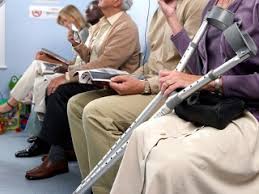February 5th, 2011 by Veronica Sikka, M.D., Ph.D. in Health Policy, Opinion
No Comments »
 In 1986, when Congress passed the Emergency Medical Treatment and Active Labor Act (EMTALA), hospitals and ambulance services were mandated by law to stabilize anyone needing emergency healthcare services regardless of citizenship, legal status, and/or insurance status.
In 1986, when Congress passed the Emergency Medical Treatment and Active Labor Act (EMTALA), hospitals and ambulance services were mandated by law to stabilize anyone needing emergency healthcare services regardless of citizenship, legal status, and/or insurance status.
This was instituted at the time to prevent the prevalent practice of “dumping” — refusing to treat patients because of insufficient insurance or transferring or discharging patients on the basis of anticipating high diagnosis and treatment costs. While the implications of this law are indeed very noble in providing undifferentiated care to all patients based solely on healthcare needs and not financial status, it has unfortunately led to many patients presenting to the emergency department (ED) for primary care issues.
The misconception is that the care in the ED is similar if not better (because of increased access to consult services and imaging) and quicker than waiting to see your primary care physician (PCP). A 2010 study published in Health Affairs found that 14 percent to 27 percent of visits to hospital EDs are nonemergent, such as minor infections, strains, fractures, and lacerations. The study found that all of these cases could have been appropriately triaged in urgent care centers or retails clinics.
England has a model that may be a potential solution. The healthcare goal of the National Health Services (NHS) is to “treat the right patients in the right place at the right time.” The NHS employs nurses and paramedics to handle 999 (their equivalent of our 911) triage calls with more appropriate triaging of patients based on acuity. Read more »
July 1st, 2010 by Nicholas Genes, M.D., Ph.D. in Better Health Network, Health Policy, Opinion
No Comments »

I recently spoke at the panel on transparency at Edelman’s New Media Academic Summit. Ben Boyd was the moderator and Ellen Miller from the Sunlight Foundation was my fellow panelist.
Reviewing some of the #nmas10 tweets from the audience, I figured I should provide some links for the anecdotes I mentioned:
Special thanks to Dr. Val Jones of Better Health for getting me involved with this group.
*This blog post was originally published at Blogborygmi*
July 24th, 2009 by Bongi in True Stories
No Comments »

 I noticed my use of the phrase ‘call it’ a few times recently. It is something I saw on American TV and not at all something that is common in my neck of the woods. The sort of scene that you would get in gray’s when the junior doctor is pumping the chest shouting ‘I will not let you die, dammit!’ while the senior doctors stand one side and instruct him to ‘call it!’ is pretty foreign to our way of doing things. I even got ragged a bit for using the phrase at all. I thought I’d relate a story from days gone by that illustrates this point.
I noticed my use of the phrase ‘call it’ a few times recently. It is something I saw on American TV and not at all something that is common in my neck of the woods. The sort of scene that you would get in gray’s when the junior doctor is pumping the chest shouting ‘I will not let you die, dammit!’ while the senior doctors stand one side and instruct him to ‘call it!’ is pretty foreign to our way of doing things. I even got ragged a bit for using the phrase at all. I thought I’d relate a story from days gone by that illustrates this point.
It was the time of the taxi wars. Now taxis in our country are nothing like you might be thinking. They are fleets of mini-buses, quite often owned by people of questionable legal character. Occasionally rival groups try to take each other out (I mentioned this before here). But roughly at the turn of the millennium there was outright war. When the war came to Pretoria we saw quite a few of the victims, but neurosurgery got the most. A friend of mine was rotating through neurosurgery and this story came from him.
There had been a contact between two different taxi organisations. The casualties were streaming in. The neurosurgeon and my friend, his trusty lackey, were overworked and I think it had affected their sense of humour. So while they were getting another gunshot head ready for surgery and heard another four were en route, they were not amused. When the ambulances arrived the neurosurgeon said he wanted to go out and triage them in the ambulances before they were unloaded. And this is what they did.
The neurosurgeon looked at each patient in turn. The first three he told them to send into casualties for his attention. But the fourth…he took one look at the fourth and exclaimed;
“Vat hom weg! hierdie een is gefok!*”
My colleague laughed the next day when the newspapers reported: “On arrival at the hospital, one taxi driver was declared dead by the neurosurgeon on duty.” Fortunately they did not quote him verbatim.
*take him away! this one is f#@ked!

*This blog post was originally published at other things amanzi*
In 1986, when Congress passed the Emergency Medical Treatment and Active Labor Act (EMTALA), hospitals and ambulance services were mandated by law to stabilize anyone needing emergency healthcare services regardless of citizenship, legal status, and/or insurance status.













